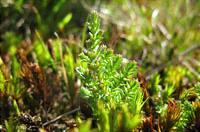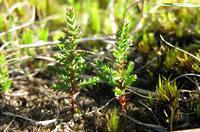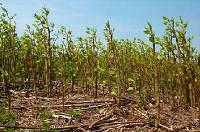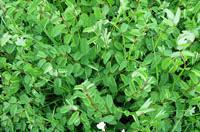The British flora has many species that only occur at a few locations. This makes them very vulnerable to development, because the loss of a site could result in the extinction of that species. Some, such as the rare Welsh groundsel Senecio cambrensis, only occur in a few places and their presence on a site could potentially stop development entirely or, at the very least, require mitigation. The cost of this mititation could be so high that it affects the commercial viability of a project. To avoid this we strongly advise developers to have an Extended Phase 1 Habitat Survey carried out before they sign a contract to buy or lease land. The cost of the survey will be significantly less than the potential cost of mitigation.
Another issue that needs to be considered is whether an invasive plant such as Japanese knotweed Fallopia japonica is present. Most invasive plants can be easily controlled, but Japanese knotweed is very persistent and will require at least three years of spraying to control it. The roots of Japanese knotweed often extend for as much as 7 metres from any visible aerial growth and new plants can grow from a fragment of root as small as a fingernail.
Have you ever wondered why some plants grow well in your garden and others fail? In most case it is down to the soil. For example heathers will rarely grow well on alkaline soils and Clematis will usually languish on acid soil. The same applies to commercial developments. There is absolutely no point in planting nursery stock that was intended for normal garden soil on acid mine spoil. In the same way it is impractical to try and create an old meadow type of plant community on land that was previously used for arable crops. It just won't work. In some cases it is worth having a soil sample collected and analysed to determine what type of soil you have.
Cheshire Ecology Ltd. can provide you with plant lists that are tailored to your development. We will work with your landscape architect to produce a successful planting scheme. This advice will satisfy the requirements of the local planning authority and produce a long-lasting planting scheme. We can also provide you with a list of 'ecologically useful' plants for a BREEAM assessment or CSH development.
We would strongly advise developers to consult an experienced ecologist before they acquire land for development. The presence of rare plants, Japanese knotweed or a protected species of animal could potentially affect the financial viability of a scheme.





